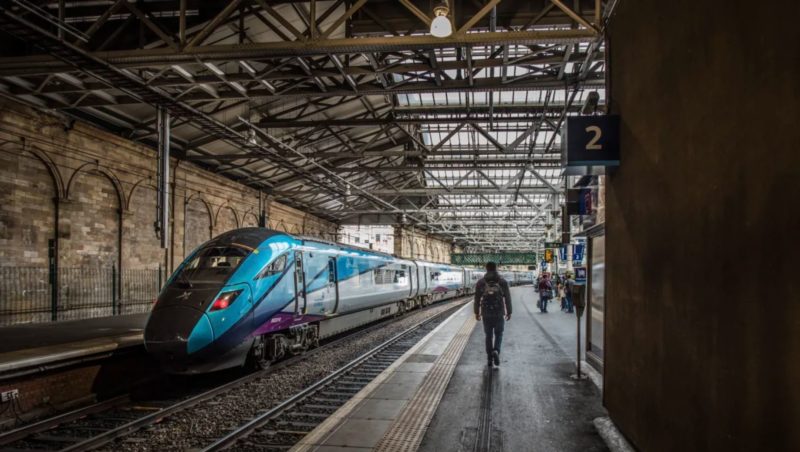Rail traction traditionally tends to be powered by electricity (be it overhead or via the rail) or via a combustion engine (diesel-powered normally).
Well, Hitachi Rail, Angel Trains and TransPeninne Express have agreed to trial retrofitting batteries on an intercity train – and on Class 802 “Nova 1” train.

Transpennine Express “Nova 1” Class 802 Train – Image, Hitachi Rail.
According to Hitachi, installing battery technology on a Hitachi intercity train will help cut fuel usage and reduce carbon emissions by at least 20%.
A successful trial of the technology will unlock the potential for further emission and fuel savings to support industry decarbonisation targets. It will in theory cut fuel usage by at least 20% and reduce emissions on the Transpennine network from 2022 onwards
Once complete, the trial provides a pathway for Hitachi Rail, the train builder and maintainer, and Angel Trains, the train’s owner to develop plans to retrofit batteries to the wider fleet. For Transpennine Express, this will impact the Class 802 “Nova 1” trains that are used to connect major towns and cities across Northern England and Scotland.
The trial will see a diesel engine replaced by batteries to help power a five-carriage train, along with the two remaining engines. The power provided by the batteries will help to reduce the amount of fuel required to operate the train.
While parts of the TPE route are electrified, trains are currently required to use their diesel engines for the majority of the time. Ahead of the completion of full electrification, adding a battery and creating an electric-diesel-battery hybrid, offers a fast and effective means of reducing carbon emissions.
In Quotes
Peter Wilkinson, Managing Director for Passenger Services at the Department for Transport (DfT) said:
“I’m thoroughly delighted to see these battery trains progressing. In a world increasingly vulnerable to climate change, and the environmental and atmospheric impacts of carbon and other forms of pollution, the rail industry must both show leadership and take the lead; waiting for permission simply won’t be an acceptable excuse. This project is an exemplar and we are going to need others like it if we are to succeed in creating a future mixed economy of modern, environmentally clean and safe future rolling stock traction solutions.”
Jim Brewin, UK & Ireland Country Lead, Hitachi Rail said:
“This trial can deliver a significant green boost to passengers and operator alike, improving air quality, cutting carbon emissions by at least 20% and reducing fuel costs. Hitachi Rail is a world leader in battery technology and believes it will be key to the UK hitting its net zero targets.
“As a business with a footprint across the North of England and with our factory at Newton Aycliffe, we see enhancing the TPE network as meeting the Government’s levelling up agenda, delivering greener, more efficient services to the region.”
Malcolm Brown, CEO Angel Trains said:
“Investing in battery technology for our fleet of Hitachi Class 802 trains is critical to delivering a greener service for passengers travelling with First TransPennine Express. We are committed to supporting the Government’s net zero targets and working collaboratively with our partners to achieve these goals.”
Steve Montgomery Managing Director of First Rail said:
“We recognise and welcome opportunities to invest in sustainable rail initiatives and support innovations such as this which create solutions to help improve rail’s emissions and air quality, accelerating the transition to a zero carbon world. Working with our industry partners ensures that we achieve a better environment for our customers and will further encourage them to switch from cars to trains, which have a lower environmental impact per passenger mile.”
A change for the 802 fleet
Transpennine Express took delivery of their “Nova 1” Class 802 Intercity Express Trains in 2019 as part of their fleet renewal (involving switching away from Siemens Desiro Class 185 DMUs, as well as ordering electric trainsets and locomotive hauled stock from CAF).
The trains have been derived from both the Shinkansen technology, as well as ongoing development from the Class 800 Intercity Express Train Project – which has formed the basis of trains that operate on both the Great Western Main Line and East Coast Main Line Services.
Whilst there is substantial work that can be done to improve the status of electrification in the United Kingdom (for example, improving the quality of electrification on the East Coast Main Line, electrifying the Transpennine routes and so on – something that needs to be looked at hard at a government level along with the political will to enact such a programme of work), using batteries to help reduce carbon output is as a start – depending on how those batteries are being charged and of course – how long they last before being depleted.
It’ll be interesting to see the results of the trial and see if other companies with the exact same trains apply these changes.
Welcome to Economy Class and Beyond – Your no-nonsense guide to network news, honest reviews, featuring in-depth coverage, unique research, as well as the humour and madness as I only know how to deliver.
Follow me on Twitter at @EconomyBeyond for the latest updates! You can follow me on Instagram too!
Also remember that we are part of the BoardingArea community, bringing you the latest frequent flyer news from around the world.